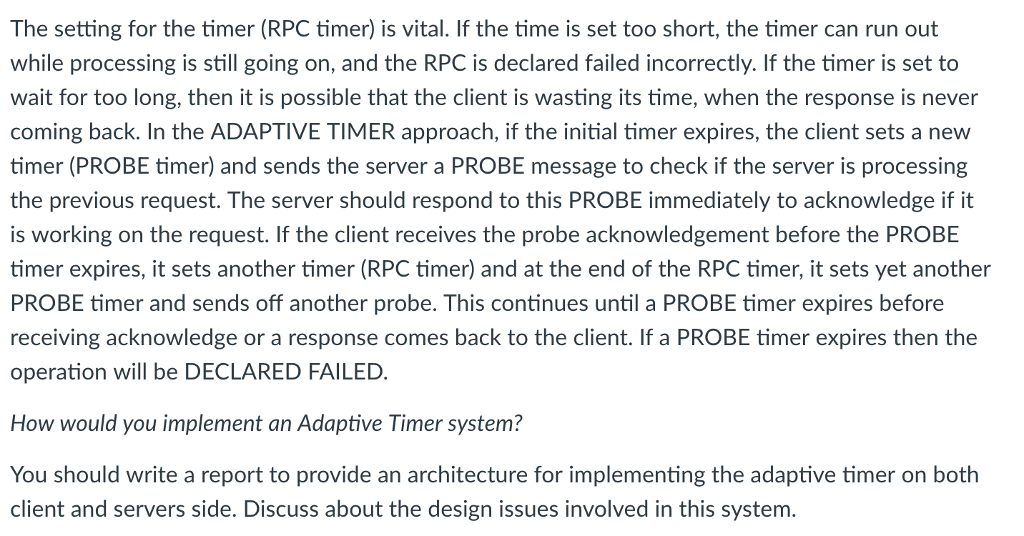Question
How would you implement an Adaptive Timer system? (Distributed System) While designing this system, you need to consider following questions: Which operations require the implementation
 How would you implement an Adaptive Timer system? (Distributed System)
How would you implement an Adaptive Timer system? (Distributed System)
While designing this system, you need to consider following questions:
Which operations require the implementation of Adaptive Timers?
How long will you set the length of the timer? Will you change this value after you get the probe acknowledgement? If so, how will you change it, longer or shorter? Why?
Will your client be able to tell from the acknowledgement that: the server as whole is running (not sure about if your request is being processed) or your request is being processed.
How can the server respond to the probe immediately?
The setting for the timer (RPC timer) is vital. If the time is set too short, the timer can run out while processing is still going on, and the RPC is declared failed incorrectly. If the timer is set to wait for too long, then it is possible that the client is wasting its time, when the response is never coming back. In the ADAPTIVE TIMER approach, if the initial timer expires, the client sets a new timer (PROBE timer) and sends the server a PROBE message to check if the server is processing the previous request. The server should respond to this PROBE immediately to acknowledge if it is working on the request. If the client receives the probe acknowledgement before the PROBE timer expires, it sets another timer (RPC timer) and at the end of the RPC timer, it sets yet another PROBE timer and sends off another probe. This continues until a PROBE timer expires before receiving acknowledge or a response comes back to the client. If a PROBE timer expires then the operation will be DECLARED FAILED. How would you implement an Adaptive Timer system? You should write a report to provide an architecture for implementing the adaptive timer on both client and servers side. Discuss about the design issues involved in this system The setting for the timer (RPC timer) is vital. If the time is set too short, the timer can run out while processing is still going on, and the RPC is declared failed incorrectly. If the timer is set to wait for too long, then it is possible that the client is wasting its time, when the response is never coming back. In the ADAPTIVE TIMER approach, if the initial timer expires, the client sets a new timer (PROBE timer) and sends the server a PROBE message to check if the server is processing the previous request. The server should respond to this PROBE immediately to acknowledge if it is working on the request. If the client receives the probe acknowledgement before the PROBE timer expires, it sets another timer (RPC timer) and at the end of the RPC timer, it sets yet another PROBE timer and sends off another probe. This continues until a PROBE timer expires before receiving acknowledge or a response comes back to the client. If a PROBE timer expires then the operation will be DECLARED FAILED. How would you implement an Adaptive Timer system? You should write a report to provide an architecture for implementing the adaptive timer on both client and servers side. Discuss about the design issues involved in this system
Step by Step Solution
There are 3 Steps involved in it
Step: 1

Get Instant Access to Expert-Tailored Solutions
See step-by-step solutions with expert insights and AI powered tools for academic success
Step: 2

Step: 3

Ace Your Homework with AI
Get the answers you need in no time with our AI-driven, step-by-step assistance
Get Started


